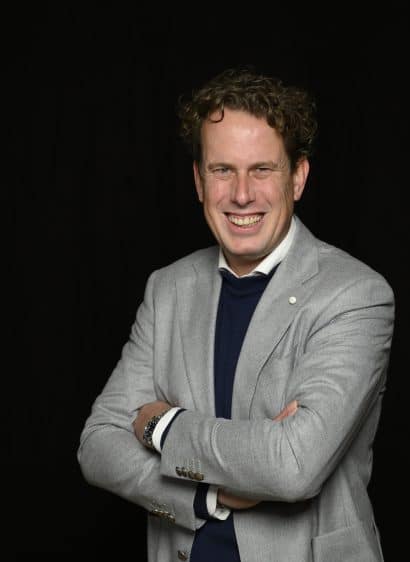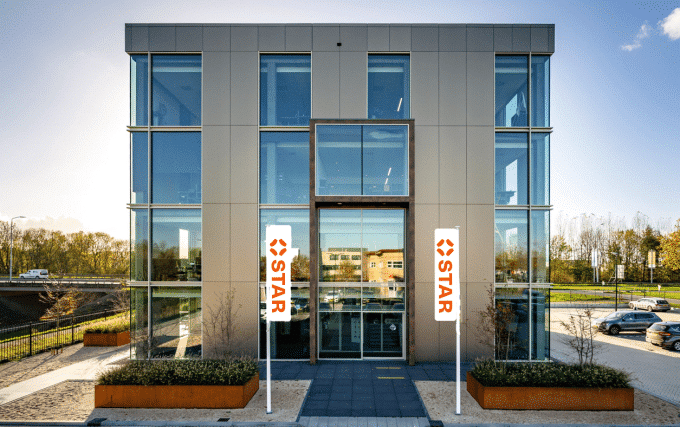We aim to keep improving for our clients.
And we do so by getting the best out of ourselves and each other. In this series, you are introduced to STAR through the eyes of our employees. This time, commercial manager Laurens van Bemmel.
“STAR can make important contributions to the transition from gas to green.” Sustainability initiatives are perhaps Laurens’ greatest professional passion. “Everything at STAR revolves around technical specialists. We staff projects with just the right specialists from start to finish. Green energy projects, for instance. For the most part, such projects require the same skills as traditional projects. And that’s a great place to start.”
New opportunities
The transition to green energy is by no means straightforward, cautions Laurens. “It is, in fact, no less than a cultural shift. It started quite a while ago, and it has quite a while to go before it will be finished – perhaps another 20 years. Right now, we’re in the middle of it.
There are differences in approach from country to country. Environmental legislation in the Netherlands, for instance, is stricter than in Belgium. That sometimes means that even large CAPEX projects cannot go ahead in the Netherlands because the cost of emissions reduction is simply too great.”
What kind of sustainability projects is STAR involved in? “Various projects in wind energy, for instance,” says Laurens. “That’s a major green initiative that’s already well underway and has sparked the construction of countless offshore wind farms. The turbines, transformer stations, the requisite infrastructure – STAR is involved every step of the way.”
Sustainable fuels feature prominently in our portfolio, too: methanol and hydrogen. “The opportunities on an industrial scale are still very much at the infancy stage. Factories are being converted to methanol and hydrogen power supplies, entirely new installations and infrastructure are being designed and built; the industry as a whole is studying hard to learn what can be done and what not. And in order to be successful, this learning stage requires the dedication of experienced specialists who know what they’re doing.
“We know that certain specialists can really add value to such sustainability projects, as their passion for the job helps our clients take strides rather than steps.”
From heavy industry to greenhouse horticulture
“In addition to efforts related to green sources of energy, developments in the field of CO2 capture and storage are of great interest, too. Take an initiative such as Porthos, in the Port of Rotterdam. It’s an alliance between the port, EBN and Gasunie that is implementing systems to capture CO2 from heavy industry and transport it to empty gas fields beneath the North Sea, where it can be safely stored: CCUS, Carbon Capture Utilisation & Storage. STAR is part of this fantastic initiative as preferred supplier to Gasunie.”
“Many specialists want to contribute to a greener society.”
A similar project that has been live for a while longer is in the hands of OCAP, explains Laurens. “About 15 years ago, an oil pipeline between Rotterdam and Amsterdam, built in the 1970s to boost development of Amsterdam’s port, became redundant and was purchased by VolkerWessels. The construction services giant built CO2-capture installations and used the pipeline to transport the CO2 to greenhouses in the Westland region of the country. Plants need CO2, and this new source meant that growers could significantly reduce the amount of traditional fossil fuels they needed to burn to obtain it.”
OCAP has supplied pure CO2 sourced from heavy industry to the horticulture sector since 2002. The amount of natural gas being saved is equivalent to the demand of 100,000 households a year. “STAR was involved in constructing the new infrastructure from the old pipeline to the greenhouses,” says Laurens proudly. “And I was involved, too, working on the project for a different company. It’s great to witness up close how projects such as these develop into successful, profitable and above all sustainable undertakings.”
Pioneering work
What does the future hold for STAR in terms of green? “I think we’re going to focus on and specialise further in the initiation and study phases of projects that precede engineering and construction. There’s work to do there. We’re currently training specialists in anticipation of the shift to hydrogen technologies, for instance. What are the ins and outs? What does hydrogen mean for production processes? It all stands us in good stead to better understand as new realities take shape, and to become involved in areas such as process design.”
What are your personal ambitions at STAR? “STAR now has a presence in the Netherlands, Germany and Belgium. I’m involved in Germany and would be delighted to see our approach more widely recognised there. Apart from contributing to that, I’ve always been very interested in the shift from gas to green, so I intend to remain in the front seat in that respect. Through Gasunie, STAR is involved in several fantastic projects that really make a difference. Many of our specialists want to contribute to a greener society and I’m here to back them up in their pioneering work.”



